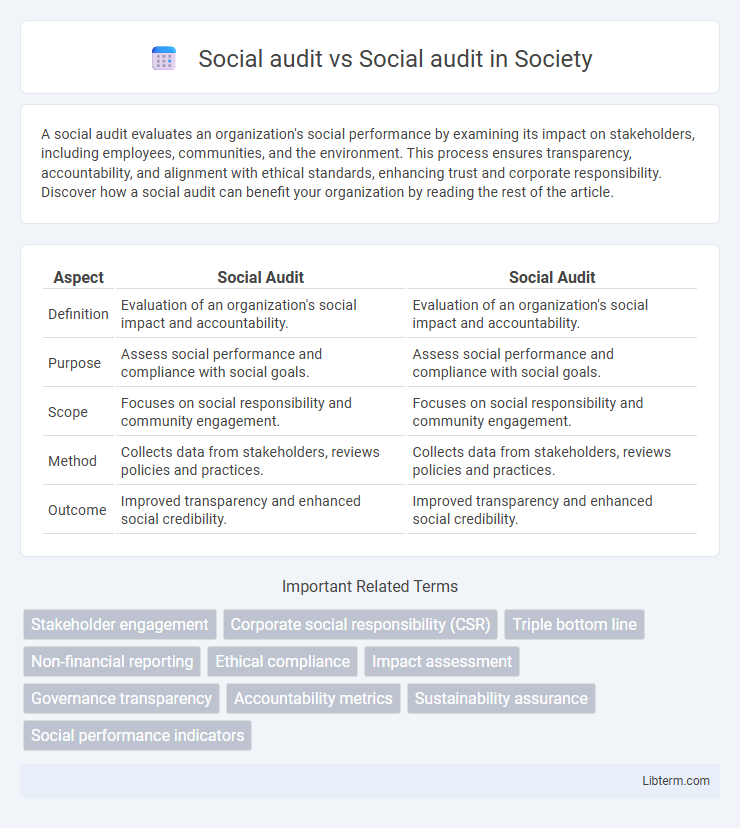A social audit evaluates an organization's social performance by examining its impact on stakeholders, including employees, communities, and the environment. This process ensures transparency, accountability, and alignment with ethical standards, enhancing trust and corporate responsibility. Discover how a social audit can benefit your organization by reading the rest of the article.
Table of Comparison
| Aspect | Social Audit | Social Audit |
|---|---|---|
| Definition | Evaluation of an organization's social impact and accountability. | Evaluation of an organization's social impact and accountability. |
| Purpose | Assess social performance and compliance with social goals. | Assess social performance and compliance with social goals. |
| Scope | Focuses on social responsibility and community engagement. | Focuses on social responsibility and community engagement. |
| Method | Collects data from stakeholders, reviews policies and practices. | Collects data from stakeholders, reviews policies and practices. |
| Outcome | Improved transparency and enhanced social credibility. | Improved transparency and enhanced social credibility. |
Introduction to Social Audit
Social audit is a systematic evaluation of an organization's social performance and impact on stakeholders, emphasizing transparency and accountability. It involves assessing compliance with social norms, ethical standards, and corporate social responsibility initiatives to ensure organizational practices align with community and environmental expectations. Social audits foster stakeholder trust by verifying social claims and promoting sustainable development through participatory evaluation processes.
Definition of Social Audit
Social audit is a process that evaluates an organization's social performance and impact by measuring its adherence to social responsibility standards and stakeholder expectations. It involves assessing internal policies, practices, and outcomes related to social justice, ethical operations, and community development. The objective is to ensure transparency, accountability, and improvement in social contributions beyond financial metrics.
Core Objectives of Social Auditing
Social auditing centers on evaluating an organization's social responsibility performance and its alignment with ethical standards, ensuring transparency and accountability to stakeholders. Core objectives include assessing the social impact of operations, verifying compliance with labor laws and human rights, and fostering community engagement to improve overall societal welfare. This process helps organizations identify social risks, enhance corporate social responsibility (CSR), and build trust among consumers and local communities.
Key Processes in Social Audit Implementation
Key processes in social audit implementation include stakeholder identification, data collection through surveys and interviews, and verification of social impact outcomes against predefined goals. Social audits emphasize transparency and accountability by involving community members in evaluating organizational performance and resource allocation. The iterative process of feedback incorporation ensures continuous improvement in social responsibility practices and alignment with social objectives.
Types of Social Audits
Social audits encompass various types, including participatory social audits, which involve community members directly in evaluating public projects, and compliance social audits that assess adherence to regulations and standards. Performance social audits focus on measuring the efficiency and impact of social programs, while financial social audits examine the proper use of funds and transparency in social initiatives. Each type serves a distinct purpose in promoting accountability, transparency, and stakeholder engagement within social and development projects.
Social Audit vs Financial Audit
Social audit evaluates an organization's social impact, focusing on transparency, ethical practices, and community engagement, while financial audit assesses the accuracy of financial statements and compliance with accounting standards. Social audit involves qualitative data on social responsibility, employee welfare, and environmental sustainability, contrasting with financial audit's quantitative analysis of financial records and internal controls. Both audits provide accountability but target different dimensions of organizational performance and stakeholder trust.
Benefits of Conducting Social Audits
Conducting social audits provides organizations with critical insights into their social performance, enhancing transparency and accountability to stakeholders. These audits help identify areas for improvement in labor practices, environmental impact, and community engagement, fostering trust and sustainable development. By systematically evaluating social responsibility initiatives, companies can mitigate risks, improve compliance, and strengthen their reputation within the industry.
Challenges in Social Audit Practices
Social audit practices face significant challenges such as lack of transparency, limited stakeholder participation, and inadequate resources for thorough evaluation. Inconsistent methodologies and insufficient data collection hinder accurate assessment of social impact and organizational accountability. Overcoming these obstacles requires standardized frameworks and improved community engagement to enhance the effectiveness of social audits.
Global Perspectives on Social Auditing
Global perspectives on social auditing reveal diverse methodologies and regulatory frameworks shaped by cultural, economic, and legal contexts. While some countries emphasize stakeholder engagement and transparency in supply chain ethics, others focus on compliance with international labor standards and environmental sustainability. Comparative social audits highlight the need for standardized metrics to enhance global accountability and impact measurement.
Future Trends in Social Audit
Future trends in social audit emphasize leveraging advanced technologies like artificial intelligence and blockchain to enhance transparency and accuracy in social performance evaluations. Increased stakeholder engagement through digital platforms fosters real-time feedback and accountability, driving more inclusive and responsive social audits. Emphasis on data analytics and sustainability metrics integrates social audits with environmental and governance factors, reflecting the growing demand for comprehensive ESG reporting.
Social audit Infographic

 libterm.com
libterm.com